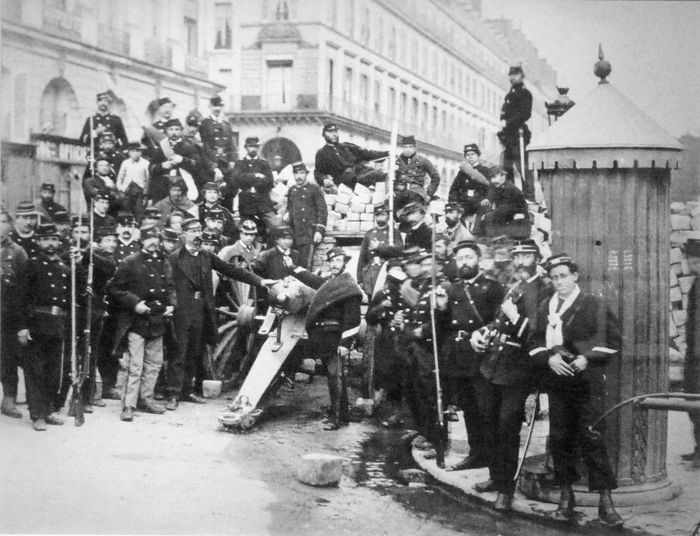In Paris there was an increasing feeling of terror. Paris, irritated at first against Versailles, shivering at the recollection of what it had suffered during the siege, was now breaking away  from the Commune. The compulsory enrollment, the decree incorporating every man under forty in the National Guard, had angered the more sedate citizens and been the means of bringing about a general exodus: men in disguise and provided with forged papers of Alsatian citizenship made their escape by way of Saint-Denis; others let themselves down into the moat in the darkness of the night with ropes and ladders. The wealthy had long since taken their departure. None of the factories and workshops had opened their doors; trade and commerce there was none; there was no employment for labor; the life of enforced idleness went on amid the alarmed expectancy of the frightful denouement that everyone felt could not be far away. And the people depended for their daily bread on the pay of the National Guards, that dole of thirty sous that was paid from the millions extorted from the Bank of France, the thirty sous for the sake of which alone many men were wearing the uniform, which had been one of the primary causes and the _raison d'etre_ of the insurrection. Whole districts were deserted, the shops closed, the house-fronts lifeless. In the bright May sunshine that flooded the empty streets the few pedestrians beheld nothing moving save the barbaric display of the burial of some federates killed in action, the funeral train where no priest walked, the hearse draped with red flags, followed by a crowd of men and women bearing bouquets of immortelles. The churches were closed and did duty each evening as political club-rooms. The revolutionary journals alone were hawked about the streets; the others had been suppressed. Great Paris was indeed an unhappy city in those days, what with its republican sympathies that made it detest the monarchical Assembly at Versailles and its ever-increasing terror of the Commune, from which it prayed most fervently to be delivered among all the grisly stories that were current, the daily arrests of citizens as hostages, the casks of gunpowder that filled the sewers, where men patrolled by day and night awaiting the signal to apply the torch.
from the Commune. The compulsory enrollment, the decree incorporating every man under forty in the National Guard, had angered the more sedate citizens and been the means of bringing about a general exodus: men in disguise and provided with forged papers of Alsatian citizenship made their escape by way of Saint-Denis; others let themselves down into the moat in the darkness of the night with ropes and ladders. The wealthy had long since taken their departure. None of the factories and workshops had opened their doors; trade and commerce there was none; there was no employment for labor; the life of enforced idleness went on amid the alarmed expectancy of the frightful denouement that everyone felt could not be far away. And the people depended for their daily bread on the pay of the National Guards, that dole of thirty sous that was paid from the millions extorted from the Bank of France, the thirty sous for the sake of which alone many men were wearing the uniform, which had been one of the primary causes and the _raison d'etre_ of the insurrection. Whole districts were deserted, the shops closed, the house-fronts lifeless. In the bright May sunshine that flooded the empty streets the few pedestrians beheld nothing moving save the barbaric display of the burial of some federates killed in action, the funeral train where no priest walked, the hearse draped with red flags, followed by a crowd of men and women bearing bouquets of immortelles. The churches were closed and did duty each evening as political club-rooms. The revolutionary journals alone were hawked about the streets; the others had been suppressed. Great Paris was indeed an unhappy city in those days, what with its republican sympathies that made it detest the monarchical Assembly at Versailles and its ever-increasing terror of the Commune, from which it prayed most fervently to be delivered among all the grisly stories that were current, the daily arrests of citizens as hostages, the casks of gunpowder that filled the sewers, where men patrolled by day and night awaiting the signal to apply the torch.